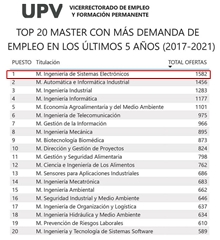 Vera (València) Campus, Universitat Politècnica de València
Vera (València) Campus, Universitat Politècnica de València
Master's Degree in Electronic Systems Engineering
90 credits
Credit 35,34 €
(2024/2025)
52 openings
(2024/2025)
Introduction
Electronic engineering is one of the cornerstones of society in the 21st century. The constant evolution that has occurred in this discipline in recent years has given an extraordinary boost to scientific, technological and industrial development, both in the field of the information and communications society and in the automation of industrial processes and the efficient processing of energy. The training of qualified professionals in the design, continuous improvement and maintenance of electronic systems responds to a demand from companies operating in these sectors, some of which actively participate in the master's degree by giving professional seminars, offering scholarships to cover tuition fees and hosting students for a certain time during the final period of their training.
Objectives
The master's degree aims to train professionals and researchers in the field of electronic engineering, focusing on both industrial applications and those oriented towards information and communications technologies. In order to do so, it has a highly qualified teaching team that includes nationally and internationally renowned professionals and guest researchers.
The latest trends in the following fields are studied: high-speed digital systems and multiprocessor systems, advanced design with digital signal processors and FPGAs, implementation of communication systems, integrated circuit design, electronic power supply and power generation systems, renewable energy sources and power supply quality, data acquisition systems, electronic instrumentation and signal processing.
Aimed at
Industrial engineers, telecommunications engineers, computer science graduates and engineers, electronics engineers, industrial automation and electronics engineers, industrial and telecommunications technical engineers, and professionals working in the field of electronics engineering.
Admission criteria
- Accredited qualificationsa
- Academic record
- Professional experience
Organisation
Department of Electronic Engineering
Cofinancing
Ministry of Education












